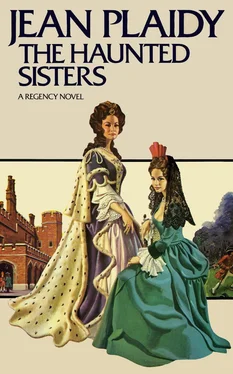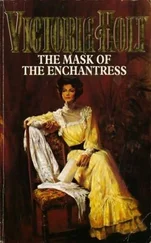Виктория Холт - Royal Sisters - The Story of the Daughters of James II
Здесь есть возможность читать онлайн «Виктория Холт - Royal Sisters - The Story of the Daughters of James II» весь текст электронной книги совершенно бесплатно (целиком полную версию без сокращений). В некоторых случаях можно слушать аудио, скачать через торрент в формате fb2 и присутствует краткое содержание. Жанр: Исторические любовные романы, на английском языке. Описание произведения, (предисловие) а так же отзывы посетителей доступны на портале библиотеки ЛибКат.
- Название:Royal Sisters: The Story of the Daughters of James II
- Автор:
- Жанр:
- Год:неизвестен
- ISBN:нет данных
- Рейтинг книги:3 / 5. Голосов: 1
-
Избранное:Добавить в избранное
- Отзывы:
-
Ваша оценка:
- 60
- 1
- 2
- 3
- 4
- 5
Royal Sisters: The Story of the Daughters of James II: краткое содержание, описание и аннотация
Предлагаем к чтению аннотацию, описание, краткое содержание или предисловие (зависит от того, что написал сам автор книги «Royal Sisters: The Story of the Daughters of James II»). Если вы не нашли необходимую информацию о книге — напишите в комментариях, мы постараемся отыскать её.
Royal Sisters: The Story of the Daughters of James II — читать онлайн бесплатно полную книгу (весь текст) целиком
Ниже представлен текст книги, разбитый по страницам. Система сохранения места последней прочитанной страницы, позволяет с удобством читать онлайн бесплатно книгу «Royal Sisters: The Story of the Daughters of James II», без необходимости каждый раз заново искать на чём Вы остановились. Поставьте закладку, и сможете в любой момент перейти на страницу, на которой закончили чтение.
Интервал:
Закладка:
Gloucester said slowly: “Mrs. Pack will die tomorrow.”
Then he walked slowly out of the room.
Mrs. Wanley staring after him, murmured: “Lord have mercy on us!” and then shrugged her shoulders.
She remembered the remark the next day, though, for Gloucester did not send to Deptford as he had every day since he had heard of Mrs. Pack’s illness.
Lewis Jenkins, thinking that he had forgotten, reminded him.
“It is no use sending,” said Gloucester gravely, “for Mrs. Pack is dead.”
“Dead!” cried Lewis. “How do you know.”
“That is no matter,” answered Gloucester, “but I am sure she is dead.”
The entire household was discussing this strange incident and Jenkins, out of curiosity, sent a messenger to Deptford to find out the state of Mrs. Pack’s health.
When the messenger returned several of the servants were eagerly waiting for him.
“Mrs. Pack died today,” he said.
They looked at each other. The little Duke of Gloucester was strange in more ways than one.
Oddly enough now that Mrs. Pack was dead he ceased to grieve for her, and it was almost as though she had never existed.
Mary, hearing the story, was struck by the strangeness of her nephew and wanted to know more about the incident and asked him if he were very upset because his old nurse was dead.
His expression was stony suddenly. He looked into his aunt’s face and said coldly: “No, Madam.”
Then in that disconcertingly adult manner, he began to talk of other subjects.
The news from the Continent was not good; Mary was beset by troubles. The Whigs were in revolt against William’s policies both at home and abroad, for they had supported him in the first place—expecting him to take orders from them, and the Tories were naturally dissatisfied. Why, Mary wondered, did men covet crowns? When she thought of the pleasant life she and William might have had, living quietly in Holland she could cry with frustration. But then William was a born leader; he would never have been content with the simple life.
She herself was discovering a talent for government which surprised no one as much as herself. She was gracious to all; she wished to be just; she was rarely arrogant and the people liked her, in spite of the spate of lampoons which were written about her and William. She had inherited some quality from her Uncle Charles which meant that when she came face to face with trouble she would be inspired to act in a manner which could best avert it.
This she was able to prove when she was with her Cabinet; as it was a ceremonial occasion she was wearing her velvet robes lined with ermine and there were jewels on her gown.
The defeats the Army had suffered on the Continent meant that the Exchequer was low and there were rumors that the country was on the edge of bankruptcy. Servants of the state had not been paid for some time and this was a condition which could not continue.
She was discussing this matter with her ministers when there were sounds of angry voices in the courtyard, and she sent one of her pages down to discover what was happening. Shortly afterward—while the shouts became nearer and more menacing—he returned to say that it was a party of sailors’ wives from Wapping who had come to demand their husbands’ pay.
Mary was aware of the consternation on the faces of her ministers. This was the first riot, they were thinking. Where was it going to end?
It was then that Mary showed her special talent.
“Go down to these women,” she said, “and tell them to select four of their group as spokeswomen; these four shall be brought to me here and I personally will talk to them and they shall tell me of what they complain.”
Her ministers were astonished.
“Did she realize that there was a mob of angry women below threatening to tear the palace apart? And did she know what a mob could be like when it was aroused?”
She answered: “They have a grievance and have come to Whitehall, I believe, to see me. It would be discourteous of me to refuse to talk with them.”
She insisted that four women were brought to her presence chamber.
When she, in her ermine and jewels, faced them in their patched serge, her ministers trembled, but she was unafraid.
So royal did she look; so large, so glittering, so very much like their picture of a Queen that even the leader of the four was temporarily overawed. And when Mary spoke to them in a beautiful soft voice which betrayed at once her sympathy they were still further taken aback, that someone who looked so sumptuous could at the same time be kind and sympathetic.
“You are anxious because your husbands have not been paid, and I understand that full well. So you came to see me about it which was a wise thing to do, and I am glad you did it. Now tell me everything that is in your minds.”
They told her. They spoke of their poverty, of the arrears which had not been paid and how the sailors’ wives of Wapping had decided that they would not accept this state of affairs.
She did not attempt to interrupt, but listened gravely, nodding her head.
When they had finished she said: “I will tell you this: Everything that is owing to you shall be paid in time. The first payment shall begin at once. I give you my word.”
There was a brief silence. Promises had been made before. But this was a woman like themselves who seemed to understand. She was magnificent yet kind; she was a Queen and they did not believe such a woman could deceive them.
“We believe Your Majesty,” said the leader of the group, turning to her companions for confirmation. They nodded.
“Then,” said the Queen, “take your friends back to Wapping, and take them in peace, for riots would serve no good to any of us.”
The four retired, reported what had happened to their friends and assured them that the Queen was a lady whom they could trust; the mob went quietly away, and, summoning the Cabinet, Mary ordered that whoever else suffered the sailors must be paid.
She made them see the wisdom of this move and that having given her promise it must be honored.
The sailors were paid and what might have been the beginning of disaster was avoided.
William was in England, rather weary, rather dispirited and poor in health.
Mary noticed that he was turning more and more to Keppel and that there was an unhealthy rivalry between him and Bentinck for William’s affections. She was sorry for this because Bentinck had been a good and faithful friend; and she was afraid that William’s obvious preference for the younger man would turn Bentinck from him.
It was Elizabeth Villiers’ doing, she knew; for Elizabeth had promoted Keppel when Bentinck had shown himself to be against her, and so subtly had she done this that she had undermined the friendship of a lifetime. Mary felt very sad to see William’s neglect of his old friend in favor of the gay young man; and more so because it was an indication of the hold Elizabeth Villiers still had on William.
It was pleasant, however, to discover that he could be amused by young Gloucester. Perhaps the boy with the grown-up manner and the big head reminded him of what he himself had been at that age; and Gloucester’s preoccupation with the Army was something they had in common.
When the boy announced that there was to be a grand field day in Kensington Gardens and invited the King and Queen to attend, William’s mouth turned up at the corners and he said to Mary: “It is an invitation we must accept.”
Mary was delighted. “Such a droll creature he is, William. He is most unusual. I never knew such a boy. If only his health would improve we should all be so much happier.”
“He certainly does not resemble his father or mother.”
Читать дальшеИнтервал:
Закладка:
Похожие книги на «Royal Sisters: The Story of the Daughters of James II»
Представляем Вашему вниманию похожие книги на «Royal Sisters: The Story of the Daughters of James II» списком для выбора. Мы отобрали схожую по названию и смыслу литературу в надежде предоставить читателям больше вариантов отыскать новые, интересные, ещё непрочитанные произведения.
Обсуждение, отзывы о книге «Royal Sisters: The Story of the Daughters of James II» и просто собственные мнения читателей. Оставьте ваши комментарии, напишите, что Вы думаете о произведении, его смысле или главных героях. Укажите что конкретно понравилось, а что нет, и почему Вы так считаете.









